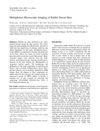 5 citations,
March 2023 in “bioRxiv (Cold Spring Harbor Laboratory)”
5 citations,
March 2023 in “bioRxiv (Cold Spring Harbor Laboratory)” Dynamic, light touch is sensed through a common mechanism involving Piezo2 channels in sensory axons.
132 citations,
April 2007 in “European journal of pharmaceutics and biopharmaceutics” The microemulsion delivered the dye deeper into the skin than the cream.
 26 citations,
April 2011 in “Skin Research and Technology”
26 citations,
April 2011 in “Skin Research and Technology” In vivo confocal scanning laser microscopy is an effective, non-invasive way to study and measure new hair growth after skin injury in mice.
1 citations,
January 2022 in “Brazilian Journal of Pharmaceutical Sciences” Minoxidil can be effectively encapsulated in coated nanovesicles for potential drug delivery.
 36 citations,
October 2014 in “Langmuir”
36 citations,
October 2014 in “Langmuir” Bleaching hair removes its protective top layer and exposes more hydrophilic groups, changing its chemical surface and affecting how it interacts with products.
 73 citations,
March 2009 in “Seminars in Cutaneous Medicine and Surgery”
73 citations,
March 2009 in “Seminars in Cutaneous Medicine and Surgery” The document concludes that accurate diagnosis of hair disorders is crucial and requires a range of diagnostic methods.
 July 2023 in “Bioengineering & translational medicine”
July 2023 in “Bioengineering & translational medicine” Mesenchymal stem cell proteins in a special gel improved healing of severe burns.
 10 citations,
May 2020 in “Journal of proteome research”
10 citations,
May 2020 in “Journal of proteome research” Explosions don't stop hair proteins from being used to identify people.
 July 2016 in “Indian journal of science and technology”
July 2016 in “Indian journal of science and technology” Neonate scalp hair is thinner, lacks a medulla, and has smaller follicles compared to adult hair.
 21 citations,
December 2016 in “European journal of pharmaceutics and biopharmaceutics”
21 citations,
December 2016 in “European journal of pharmaceutics and biopharmaceutics” Nano-sized lipid particles increase dexamethasone's skin penetration and create a reservoir in the skin layers.
 211 citations,
February 2009 in “European journal of pharmaceutics and biopharmaceutics”
211 citations,
February 2009 in “European journal of pharmaceutics and biopharmaceutics” Hair follicles help absorb and store topical compounds, aiding targeted drug delivery.
1 citations,
January 2018 in “Journal of microscopy and ultrastructure” The method can identify minerals in hair from water, and using coconut oil or conditioner can prevent mineral buildup.
 54 citations,
October 2002 in “Journal of controlled release”
54 citations,
October 2002 in “Journal of controlled release” Medium lipophilic substances penetrate skin best, and adding ethanol can increase delivery to hair follicles.
 1 citations,
December 2014 in “Scanning”
1 citations,
December 2014 in “Scanning” Multiphoton microscopy effectively images rabbit skin structures in detail without staining and shows differences from human skin.
 305 citations,
June 2012 in “Nature”
305 citations,
June 2012 in “Nature” Hair regeneration needs dynamic cell behavior and mesenchyme presence for stem cell activation.
 5 citations,
September 2015 in “BMC Medical Genetics”
5 citations,
September 2015 in “BMC Medical Genetics” The EDAR gene mutation leads to thinner and more deformed hair shafts.
 4 citations,
July 2023 in “Pharmaceutics (Basel)”
4 citations,
July 2023 in “Pharmaceutics (Basel)” Nanoparticle-based drug delivery to hair follicles is more effective when tested under conditions that match skin behavior.
 56 citations,
June 2015 in “Nature Protocols”
56 citations,
June 2015 in “Nature Protocols” Two-photon microscopy helps observe hair follicle stem cell behaviors in mice.
September 2023 in “Animals” Hair follicle development in cashmere goats involves dynamic changes in proteins and metabolites, with key roles for oxytocin, MAPK, and Ca2+ pathways.
 19 citations,
December 2015 in “Journal of Investigative Dermatology”
19 citations,
December 2015 in “Journal of Investigative Dermatology” The protein p53 directly reduces the production of Keratin 17, a skin and hair protein, in rats with radiation dermatitis.
February 2024 in “Medicina” AFM can diagnose hair disorders by revealing detailed hair surface changes.
 May 2016 in “The Journal of Sexual Medicine” 11 citations,
October 2003 in “PubMed”
May 2016 in “The Journal of Sexual Medicine” 11 citations,
October 2003 in “PubMed” Treatments with certain oils and resins make hair shinier, while zinc oxide and synthetic sebum make it duller.

Sensory neuron remodeling and Merkel-cell changes happen independently during skin maintenance.

Sensory neuron changes and Merkel-cell changes in the skin happen independently during normal skin maintenance.
1 citations,
January 2010 in “Biological and medical physics series” Human hair's structure and properties were studied using advanced microscopes and mechanical tests.
1 citations,
April 2023 in “Scientific Reports” Self-assembling RADA16-I hydrogels with bioactive peptides significantly improve wound healing.
 61 citations,
December 2016 in “The EMBO Journal”
61 citations,
December 2016 in “The EMBO Journal” The study showed that hair follicle stem cells can maintain and organize themselves in a lab setting, keeping their ability to renew and form hair and skin.

Sensory neurons and Merkel cells remodel at different rates during normal skin maintenance.

Sensory neuron and Merkel cell changes in the skin happen independently during normal skin maintenance.






















